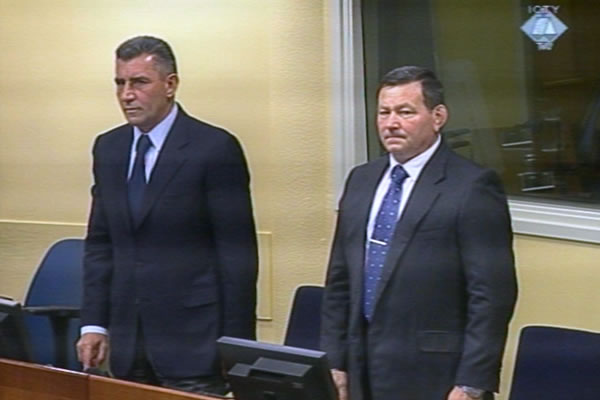Home
NEITHER INDIVIDUAL NOR COMMAND LIABILITY FOR GOTOVINA AND MARKAC
The defense teams explain why in their view the Croatian generals shouldn’t be convicted of aiding and abetting crimes if the Appeals Chamber finds they are not guilty of unlawful artillery attacks on Knin and their part in the joint criminal enterprise aimed at expelling Krajina Serbs during and after Operation Storm
 Ante Gotovina and Mladen Markac in the courtroom
Ante Gotovina and Mladen Markac in the courtroom The defense teams of Ante Gotovina and Mladen Markac contend that their clients shouldn’t be convicted on the basis of alternative modes of liability if the Appeals Chamber finds them not guilty of indiscriminate artillery attacks on Krajina towns and their part in the joint criminal enterprise carried out in the summer of 1995. The alternative modes of liability relate to possible guilt of the accused on the basis of command responsibility, which includes aiding and abetting persecution, deportation, murder, wanton destruction, looting, cruel treatment and other inhumane acts.
In April 2011, generals Gotovina and Markac were sentenced to 24 and 18 years in prison respectively for their part in the joint criminal enterprise aimed at expelling Serbs from Krajina during and after Operation Storm. Gotovina’s and Markac’s defense teams appealed against the judgment. The Appeals Chamber, acting with uncommon haste, called the prosecution to present its opinion on the possibility of convicting the Croatian generals on the basis of their command responsibility if they were not found guilty on the basis of individual responsibility. As the prosecution noted in its brief, if that were to be the case, the Croatian generals should be convicted on the basis of command responsibility and their sentences shouldn’t be reduced. The defense teams have filed their responses to the prosecution’s brief.
The prosecution contends that Gotovina’s and Markac’s conviction couldn’t be underpinned solely by the conclusions about the indiscriminate shelling of Knin and other Krajina towns. Unlike the prosecution, the defense claims that all findings in the Trial Chamber’s judgment were based on the conclusion that there had been an indiscriminate attack. Therefore, the defense holds that if the Appeals Chamber dismisses this finding, there are no grounds for the conviction of Gotovina and Markac of any other charge.
Gotovina’s defense contends that the Trial Chamber’s judgment indicates that the crimes of persecution and deportation had been committed in the course of the alleged indiscriminate artillery attack on civilians. If the Appeals Chamber were to conclude that there was no such attack, then the accused couldn’t be found guilty on that ground. In its response to the prosecution’s argument that crimes against civilians, such as deportation, murder, destruction and looting were committed after the artillery attack, the defense notes that the judgment treated those acts as part of the artillery attack. The Trial Chamber found that Gotovina was responsible for creating a ‘general atmosphere of crime’, the defense notes.According to the judgment, the crimes committed after Operation Storm were committed in ‘light of [Gotovina’s] order to launch an unlawful attack on civilians and civilian buildings’.
Markac’s defense lawyer offered a similar argument. In their view, the accusations against Markac changed during the trial. This made Markac swing ‘from hope to desperation’; the defense warned the Appeals Chamber that the accused couldn’t be a ‘toy in the hands of justice’.
The defense teams have earlier objected to the very possibility that the Appeals Chamber may deal with alternative modes of liability of the accused. According to the defense, this cannot be done in the appellate stage because neither party has filed such a motion.
Linked Reports
- Case : Gotovina et al. - "Operation Storm"
- 2012-07-20 MODES OF LIABILITY FOR GOTOVINA AND MARKAC
- 2012-05-14 MARKAC’S DEFENSE BRINGS DOWN ‘HOUSE OF CARDS’
- 2012-05-14 GOTOVINA’S DEFENSE DENIES UNLAWFUL ATTACKS ON CIVILIANS
- 2012-09-18 GOTOVINA AND MARKAC BACK IN COURT FOR A SHORT TIME
- 2012-11-02 GOTOVINA AND MARKAC FINAL JUDGMENT SLATED FOR 16 NOVEMBER 2012
- 2012-11-16 JUDGES DIVIDED, GOTOVINA AND MARKAC WALK FREE
